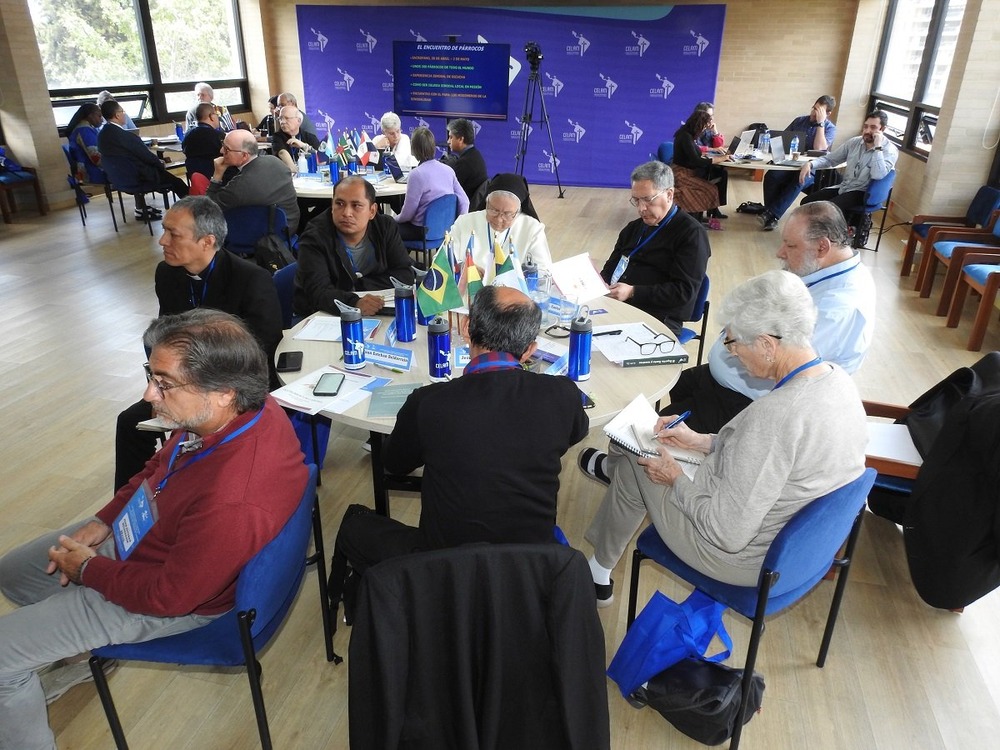
Synod assembly members from Latin America participate in a meeting at the headquarters of the Latin American bishops' council in Bogotá, Colombia, Aug. 12, 2024. (CNS/ADN CELAM)
Just two months before the Synod of Bishops gathers again in Rome, its Latin American members met to discuss how synodality can be implemented in the Catholic Church after the close of the assembly in October.
At the headquarters of the Latin American bishops' council, known as CELAM, in Bogotá, Colombia, 42 Latin American members of the synodal assembly — 19 bishops, five priests, seven religious sisters and 11 laypeople — discussed how the assembly can push the church to incorporate synodality into its practices and culture after the current synod ends.
Bishop Luis Marín de San Martín, undersecretary of the synod, opened the Aug. 12-14 meeting by explaining that the aim of the current synod is to "strengthen, develop and concretize synodality in the church," CELAM's news agency, ADN, reported. The bishop affirmed the need to think of the post-synodal phase of the process, which includes the need to strengthen church unity and casting aside fears about plurality in the church.
Jesuit Father Giacomo Costa, special secretary of the synod, said that while the synod's first assembly consisted of finding areas of convergence and establishing dialogue between members, the upcoming assembly should focus on thinking of concrete "directions or steps for growing as a missionary church."
"All ideological, theological and even structural development must be made concrete in the life of the church," he said, adding that the second session should "suggest something concrete to the pope on different subjects, directions and steps."
"Synodality, just as theology or the church, has faces and is made concrete in people, which is why we insist on concreteness," Costa said.
"It is not enough to have a synod, it is necessary to become a synod," said Argentine theologian Father Carlos María Galli.
Vatican News reported that Bishop Lizardo Estrada, secretary-general of CELAM, urged meeting participants not to fall into formalities or intellectualism but to encounter one another "with the freedom of the sons and daughters of God, to converse in the Spirit and allow ourselves to be led by him, courageously assuming the challenges given to us."
Archbishop Jaime Spengler of Porto Alegre, Brazil, CELAM president, opened the meeting by presenting guiding questions to the participants, including: "How can we walk together when individualism, clericalism and self-referentiality are worryingly on the rise?" and "How can we transmit the faith to new generations?"
On the meeting's second day, Argentine theologian Father Carlos María Galli spoke about the synod's method of "conversation in the Spirit," ADN reported, but also outlined steps the church still needed to make.
Advertisement
"Conversation in the Spirit" is a dialogue method promoted by the General Secretariat of the Synod rooted in alternating periods of silence, prayer and sharing, which are intended to help people to exchange ideas and work together despite encountering differences.
"Every day we must make every effort to walk together, not only with those who think the same way, but with all believers in Jesus,” Galli said.
He added that the working document for the synod's second assembly is not a magisterial document nor a catechesis, but rather the compilation of topics raised by the people of God that seeks to make concrete how the church can "realize missionary synodality in practice."
"To be church is to be a community that walks together," he said. "It is not enough to have a synod, it is necessary to become a synod."







